“Hatchery”
Written by André Bormanis & Michael Sussman
Directed by Michael Grossman
Season 3, Episode 17
Production episode 069
Original air date: February 25, 2004
Date: January 8, 2154
Captain’s star log. Despite the fact that they’re supposed to be booking it to Azati Prime, Enterprise is in orbit around a planet where they’ve discovered the wreckage of a ship that matches the hull composition of a Xindi ship, but not the configuration. Archer puts a team together to investigate.
The only part of the ship that’s functioning is a sealed, heavily shielded compartment. The rest has no life support and is littered with Xindi-Insectoid corpses. Opening the heavily sealed compartment reveals a breathable atmosphere and a bunch of eggs. One of the eggs squirts gunk onto Archer. He immediately goes back to Enterprise (at T’Pol’s urging; he initially insists he’s fine, because he’s a macho asshole, but T’Pol’s wiser head thankfully prevails) to be examined by Phlox. The doctor determines that it’s a mild neurotoxin, and treats the rash it caused and hypothesizes that it was a defense mechanism designed to protect the eggs. He’s both right and wrong…
The sealed room was a hatchery. Based on his autopsy of the dead Insectoids, Phlox determines that they’re asexual and reproduce pretty constantly. They’re also short-lived, and Phlox theorizes that every Insectoid ship has such a hatchery.
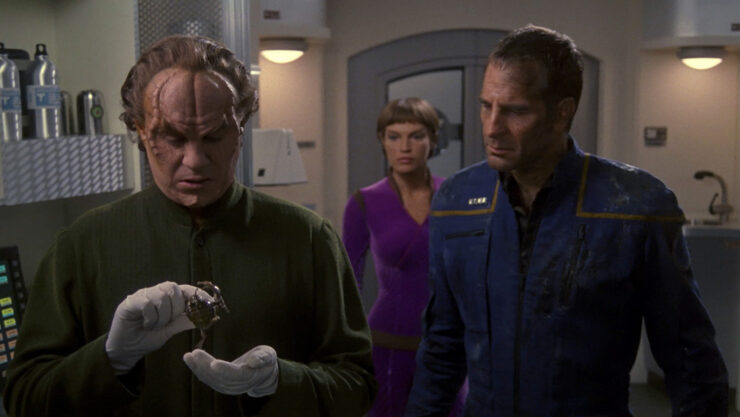
T’Pol and Tucker report that the Insectoids died because they took damage coming out of their subspace corridor and crash-landed. Most of the crew died of asphyxiation because they transferred what power they had left to the hatchery—and its power is failing as well.
Archer orders them to power the hatchery up. Tucker objects to aiding the enemy like this, but Archer points out that the Xindi want to destroy Earth because they’ve been convinced that humans are monsters. Archer would rather not give them more ammunition to support that theory by letting a room full of children die.
They spend two days on the ship trying to get the power started, and Archer finally orders Tucker to use Enterprise’s antimatter reserves to power the ship. Both Tucker and T’Pol object to it, as they really shouldn’t dip into their reserves, but Archer insists. He’s also working himself to the bone, not eating or sleeping, and focused entirely on saving the Insectoid eggs and nothing else. When T’Pol refuses to provide Archer with the antimatter, as it will endanger their mission, he relieves her of duty and confines her to quarters.
Hayes has been running simulations based on the data they’ve downloaded. While Reed is initially skeptical of the intelligence the major has gleaned, he eventually realizes that Hayes has found a good tactical suggestion for fighting the Insectoids.
Buy the Book
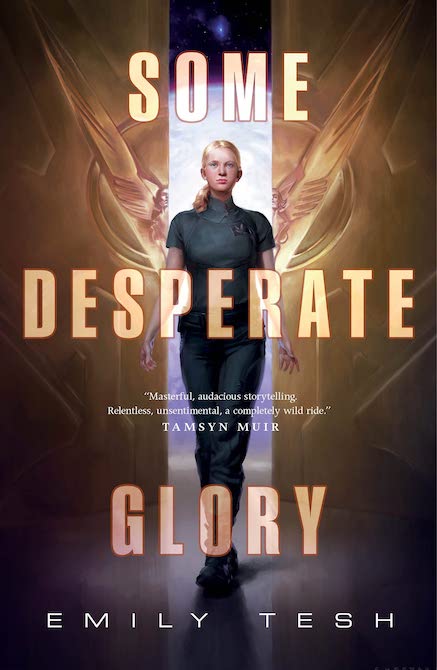

Some Desperate Glory
Tucker visits T’Pol—who’s not supposed to have visitors, but Tucker tells the MACO on guard duty that it’s not social, it’s medical, he needs to have a neuro-pressure session—and she says that he’s acting completely irrationally and they have to do something about it before the damage he does to the mission is irreparable.
A Xindi-Insectoid scout ship arrives and fires on Enterprise while Reed is the watch commander on the bridge. He summons Archer to the bridge, but by the time the captain gets there, Reed has destroyed the enemy vessel using the tactics suggested by Hayes. Archer is livid, as they could’ve given the eggs to them, but Reed insists he had no choice. Archer relieves Reed, too, and has him confined to quarters, and puts Hayes in charge of the bridge while he works on getting power to the hatchery.
Sato’s been working on translating the Insectoid’s database. Archer tells her to send a distress call to the Xindi once she’s finished with that.
Now Tucker, who was initially reluctant to go along with T’Pol’s notion of disobeying Archer, is totally on Team T’Pol. He brings Phlox to Archer, who’s loading their antimatter reserves into a shuttlepod, and insists that the captain is behaving irrationally and he should be examined. Archer thinks the whole notion is a silly goose, but agrees to be examined once they get the hatchery powered up. Tucker says that’s not good enough, and then Archer threatens to confine them both to quarters also, and they back down.
Thus beginneth the mutiny. Tucker incapacitates T’Pol’s guard, and then the two of them, Reed, and some of Reed’s security people work to take over the ship, stunning some MACOs guarding the armory. T’Pol—aided by Reed and his security people, and also by Mayweather—take over the bridge from Hayes.
By this time, Archer has taken a shuttle down with the antimatter, so Tucker and a security guard beam down to the planet. Tucker confronts Archer, who is now literally crawling with Insectoid babies. Archer tries to explain why he’s doing what he’s doing to Tucker, who just shoots him.
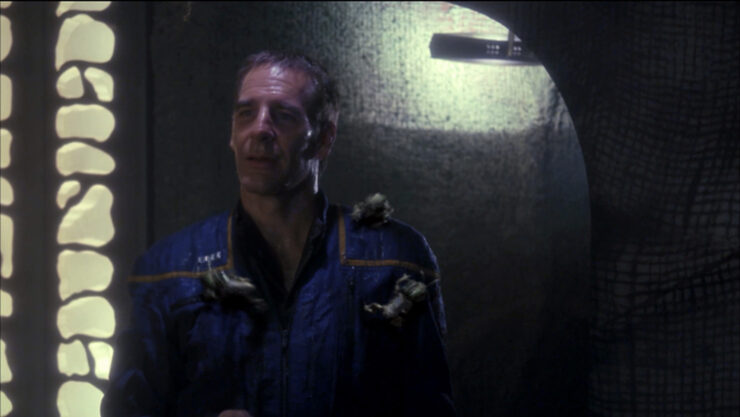
Phlox examines Archer and determines that there was a lot more to the neurotoxin Archer was sprayed with: it has a kind of reverse-imprinting effect, causing Archer to unconsciously believe that he’s the caretaker of the gestating offspring. They show the medical evidence to Hayes, who agrees that they did the right thing. He also asks Reed why he didn’t tell Hayes this, and Reed says they couldn’t risk him taking the captain’s side.
Can’t we just reverse the polarity? Xindi-Insectoids are short-lived and reproduce quite a bit, which is necessary to survive as a species, something that the writers of Voyager’s “Elogium” totally did not understand.
The gazelle speech. Archer’s initial argument to save the Insectoid eggs is actually very much the right one, spoiled by the neurotoxin-induced obsession with doing so at all costs.
I’ve been trained to tolerate offensive situations. T’Pol wears a Starfleet uniform and an NX-01 ballcap in order to enter the armory undetected, since—as the Marvel movies have demonstrated—all you need to do to disguise yourself is wear a ballcap…
Florida Man. Florida Man Commits Mutiny, Later Apologizes.
Optimism, Captain! Phlox threatens to relieve Archer of duty, but then doesn’t follow through, which seems like a mistake…
Good boy, Porthos! When Tucker visits a recovering Archer at the end of the episode, we see the captain recovering on his bunk, being snuggled by his puppy.
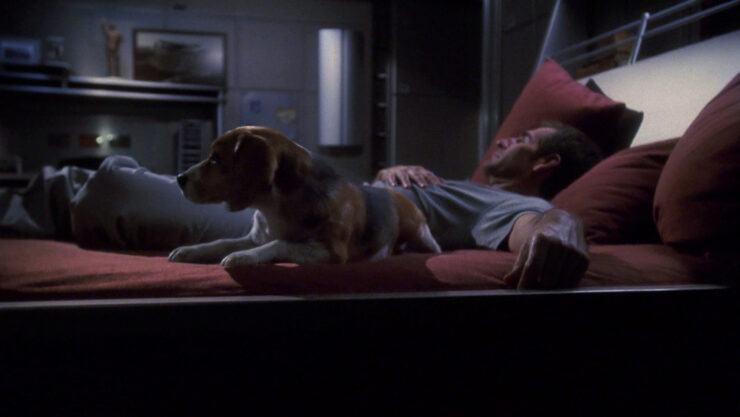
I’ve got faith…
“The Xindi are trying to destroy Earth because they heard that humans are ruthless—this this is the chance to prove them wrong!”
–Archer, making a good point that was lost in obsession.
Welcome aboard. The only guests this week are three recurring regulars as MACOs: Steven Culp as Hayes, last seen two episodes ago in “Harbinger,” who’ll be back in “Countdown”; Sean McGowan as Hawkins, last seen in “Impulse,” who’ll be back in “The Council”; and Daniel Dae Kim in his final appearance as Chang, having last been seen in “Extinction.”
Trivial matters: Enterprise has been booking it to Azati Prime since discovering that that planet is the likely construction site for the Xindi weapon in “Stratagem.”
Reed’s fear that Hayes will take his job in “Harbinger” is sorta-kinda realized in this episode.
Hayes mentions that he was trained at West Point, which means that that military academy still exists in the twenty-second century and at least some MACO officers have attended that institution.
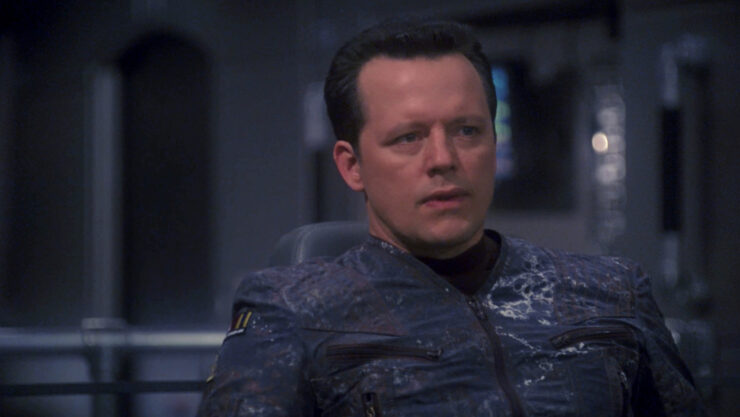
It’s been a long road… “Humans don’t throw morality out the window when things start getting a little rough.” The basic plot here is one that has promise, but pretty much every aspect of the execution is botched.
It starts with Yet Another Non-Teasing Teaser, where Archer gives the order to assemble a landing party, and then we’re reminded that it’s a long road gettin’ from there to here after absolutely nothing interesting has happened, and I just sigh.
What’s maddening about this episode is that there was a real chance for a legitimate debate here. Where is the line between fighting a war and trying to show compassion? Yes, the Xindi want to blow up Earth. However, as Archer very importantly reminds T’Pol, Tucker, and the audience, they’ve been told that humans are savages that want to destroy them. Leaving a room full of eggs to die will just reinforce that.
Unfortunately, the episode sidesteps the debate by having Archer suffer Space Madness and become the obsessive caretaker of the eggs.
The means by which to relieve Archer of duty are presented in the episode itself, with Tucker and Phlox confronting the captain in the shuttle bay, but then they back off for no compellingly good reason. At this point, Archer hasn’t slept in three days. That alone is enough cause to relieve him of duty. There’s a reason why sleep deprivation is considered a torture technique.
On top of that, we have the ridiculous conflict with the MACOs, who are portrayed as automatons who will just blindly follow whatever stupid order the captain gives. At the end, after being told by Phlox that Archer was under the influence of an alien neurotoxin, Hayes says, “Not the sort of thing they trained us for at West Point,”and I have to call bullshit on that. They absolutely do train you to notice signs that your commanding officer might be compromised or acting in a way that jeopardizes the mission. Depleting the ship’s antimatter reserves, hanging out on a planet when they’re supposed to be booking it to Azati Prime, reprimanding the acting captain for doing his fucking job when the ship is fired upon, giving an order to betray their position to the Xindi, and, again, not sleeping for three days are all things that should’ve been red flags to Hayes if he was actually any good at being a military commander.
Then again, the MACOs have generally sucked at doing their jobs this season, so maybe that’s part of it. Which is me being generous, as it’s instead a couple of Hollywood writers who have no clue how the military actually functions and just assuming that their Space Marines would be a bunch of dumb jarheads who blithely follow all orders given them by commanders, even ones who are obviously suffering from sleep deprivation. Hell, Hayes should’ve been suspicious from the moment Archer told him that Reed made a mistake in returning fire on the Xindi-Insectoid ship that ambushed them.
It’s too bad, because there was a good story buried under the nonsense. But, alas, it stayed buried.
Warp factor rating: 3
Keith R.A. DeCandido will be an author guest at the first-ever Trek Long Island convention this weekend at the Hyatt Regency Long Island in Hauppage, New York. He will be joined by fellow Trek scribes Robb Pearlman, Michael Jan Friedman, John Peel, Aaron Rosenberg, Glenn Hauman, Allan Asherman, and Sean Von Gorman, as well as actors Doug Jones, Oded Fehr, David Ajala, Sam Vartholomeos, Raven Dauda, and Phumzile Sitole from Discovery, Robin Curtis, BarBara Luna, France Nuyen, Sandy Gimpel, Tanya Lemani, David Frankham, and Vadia Potenza from the original series, J.G. Hertzler from DS9 (as well as Voyager and Lower Decks), Bruce Horak from SNW, and Isa Briones, Evan Evagora, and Toni Belafonte from Picard, and lots of other cool folks. Keith will primarily be in the vendor room selling and signing books, but will also be doing some programming—his full schedule can be found here.










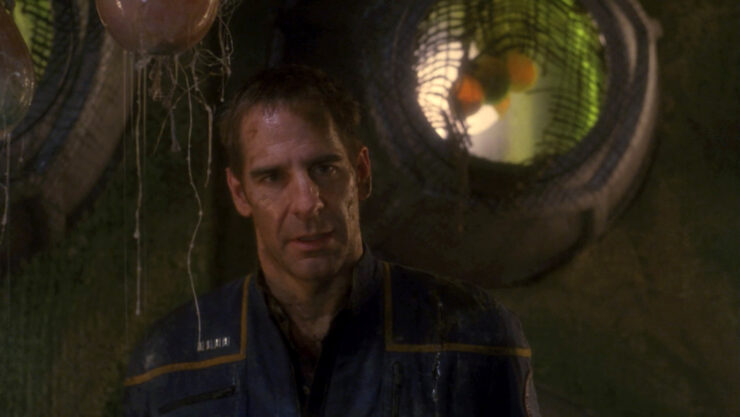
I agree. “Hatchery” is frustrating and disappointing, because it could’ve been a good episode with a genuine ethical dilemma at the core, but instead it copped out and dumbed it down by having Archer not in his right mind. And it’s doubly frustrating because he was right, dammit. There’s no excuse for abandoning children to die, no matter what side they’re on; and a gesture of kindness could’ve done a lot to prove to the Xindi that we weren’t the monsters they’d been told we were. So the direction they took this story in was infuriatingly wrongheaded.
“These Xindi are innocent. If we let them die, we’ll be proving to the others that they’re right about us.”
The problem with this one? Morally, Insane Archer is the one in the right. Sure, he eventually goes off the deep end, becoming irrational and paranoid and forgetting the fact that he’s supposed to be trying to save the world. But every time he gets challenged on his decisions, he comes up with a convincing argument for his actions, even making an apt comparison to both sides in a war agreeing to a ceasefire so a school could be evacuated. And on the other side, we get T’Pol being childishly insubordinate, Tucker wanting to take a flamethrower to Xindi children and Reed and Mayweather’s “Let them die” philosophy. Plus Reed, despite the events of ‘Harbinger’, being far more of a prick towards Hayes than is actually justified. By the end of the episode, Archer’s supposedly wrong actions have saved lives that the rest of his senior staff seemed to consider unimportant. Yay for alien mind control, I guess?
I agree it’s not entirely clear why Enterprise has stopped their rush to Azati Prime in order to investigate a random crashed Xindi ship, although it does give them tactical information on the Insectoids that they didn’t have before and another purloined enemy ship to add to their collection.
Major Hayes gets left in command of the ship and even gets to sit in the big chair. Probably the biggest role of Corporal Chang’s three appearances, although it still doesn’t exactly test Daniel Dae Kim’s acting skills. Instead, it’s Hawkins’ turn to get lost in the crowd. I was completely wrong about ‘Twilight’ being the one time we see T’Pol in Starfleet uniform. Archer mentions his great-grandfather led a battalion in the Eugenics Wars. Given that they were about 160 years previous, I guess his family tend to have children in middle age, if that’s only three generations ago?
@1. ChristopherLBennett: Given they’re apparently fully mobile from birth and from a short-lived species, it’s worth asking if these Insectoids are merely young, rather than children in the human sense of the word (which is to say, utterly dependent on their caregivers for an extended period).
This doesn’t really change the moral dynamics of the episode – Archer’s desire to see these fellows safely born is purely admirable, whether or not he’s high on Momma Juice, whether or not his methods of ensuring their nativity are entirely sensible – but it may have some bearing on whether or not these little fellows will survive long enough for a Xindi vessel to reclaim them.
Anyway, I thought this episode passable but not very impressive: I agree that it’s a pity the MACOs weren’t handled with more finesse (Though it makes perfect sense that Mr Reed simply couldn’t trust that Major Hayes would trust him) and a particular pity that we don’t see Captain Archer making more intelligent efforts to keep the Major on-side (Presumably leaning on Archer’s greater experience out in the Black and Reed’s previous displays of irrational dislike towards Hayes).
On the other hand we do get to see the crew be on-the-ball, a Vulcan in a baseball hat and a strong hint of ‘T’Pol/Hoshi 4 Eva’ so it’s not a total loss.
Also, my strong impression was that Mr Tucker and Doc Phlox backed down in the hanger bay because they weren’t certain which way the MACOs would jump and wanted to make sure they had solid back-up before they risked a confrontation with an increasingly dangerous Archer.
Oh, and some part of me can only imagine how Porthos would have reacted to those newborn Xindi…
Some things in the review and the first couple of comments I agree with, and some things where I disagree. And vice versa for the characters.
They are en route to Azati and on a very tight timetable. Yet their total flight time there is measured in weeks, and they have spent months in the Expanse. They cannot be sure that Azati Prime is the place they are looking for, and if they stumble upon signs of an Insectoid ship, it is only logical to take look. (That’s assuming they got some technobabble like subspace spectroscopy or warp plasma residue, and did not do a routine survey on every world they were passing). And as it turned out, looking taught them better ways to fight a deadly (if misguided) menace.
I’m actually a little bit conflicted regarding the duty to rescue the hatchery. I believe that anyone who comes upon the scene of an accident has the moral duty to help, provided he or she does not unduly endanger herself or himself. From what Archer said, spending one third of their antimatter reserves would have turned their mission into an one-way trip. So did they have the means to help? Take the hatchlings aboard and into a war zone? Or, as their analysis was later on, let them hatch and live on the planet? It seems that Insectoid hatchlings are sturdy for their age.
And regarding the standoff on the bridge, did everybody suddenly forget that they have stun-capable weapons? The logical thing for the larger force would have been to shoot first, risking “losses” that would not last very long. Sure, the MACOs are better trained, but quantity has a quality of its own. The last one standing has won, even with near-100% “casualties.”
@4/o.m.: Fiction tends to portray stun weapons as guaranteed to be nonlethal, but realistically, any knockout weapon carries a nonzero risk of killing the target or causing permanent damage of some kind. So it actually makes sense to portray the characters as reluctant to use their weapons except as a last resort, even on the stun setting.
Just realized something. Initially, “Hatchery” reminded me a bit of DS9’s “Dramatis Personae”, and the way it made Sisko into an obsessed clock-tinkering power-hungry madman. But it’s actually much more reminiscent of original Trek, specifically the finale, “Turnabout Intruder”. Not the body-swapping aspect of that story, but the way the crew tip-toed around Kirk’s unusual behavior since any attempt at a coup by the senior officers would be met by stiff resistance from ship’s security.
In other words, original Trek set precedent for the notion of military/security officers as jarheads who will do anything to defend the captain, even when the captain is acting out of sorts, to the point of preventing concerned senior officers of taking action that could save the ship and crew from a worse fate.
“Hatchery” is very much a trademark Brannon Braga high-concept story like many of his TNG episodes. But if the intent was always to do a captain goes bonkers story, they might as well not set such a juicy Trekkian premise of whether it’s right or not to protect the Insectoid eggs. It’s a situation where the framing story is a lot more interesting than the actual story.
I’m not as critical of the episode because of the franchise precedent of security acting as the captain’s personal guard at all times, but it definitely feels like a missed opportunity of an episode. Then again, I’m guessing at this point the writers had bigger Azati Prime concerns and how the rest of the season would unfold. “Hatchery” is a classic case of an episode that got lost in the middle.
Eduardo: Just because there’s precedent in an original series episode doesn’t let this piece of crap off the hook, especially since the episode in question is a bottom-ten TOS episode…..
—Keith R.A. DeCandido
Trek shows always do a poor job portraying military stuff, but the MACO were the worst. It made me suspect no one in the writer’s room had any military background.
There were some good ideas in this episode, and I loved the idea of a secretion amping up someone’s maternal instinct, which is a great survival trait for the little ones. The execution, though, left a lot to be desired.
The problem arises because this is a filler episode. Were it supposed to be part of the main Xindi plot, it could have been a straight-up morality tale about the Enterprise and her crew sacrificing some of their advantage to save the insectoid children, which could have changed at least that faction of the Xindi’s opinion about humanity. But since it is a filler episode, and therefore can’t change anything, there has to be a reason why, and the reason they came up with was insanity goo.
@9/David Pirtle: I wouldn’t call it a filler episode, since it’s the one episode that focuses on fleshing out the Xindi-Insectoids. If you’re going to build a season around introducing five new alien species, then any episode that focuses on developing one of them is an essential episode, not just filler. This was a badly handled attempt at an Insectoid focus episode, true, but in principle it was important to have at least one such episode.
The problem with this era of serialized TV is that people have become conditioned to assume that plot is the only thing that matters in fiction, that if something doesn’t Advance The Plot, it is therefore irrelevant filler. But plot is just one of the four elements of drama, the others being character, setting, and theme. It’s just as important to do stories that explore the characters and concepts of a series as it is to advance the plot. Indeed, I’d say that the purpose of plot is to reveal character, theme, etc., not the other way around. Setting is particularly important in science fiction and fantasy, since the creation of exotic worlds and civilizations is such a central part of those genres.
Yeah. I actually love the idea of the reverse imprint neurotoxin, it’s a really cool way for a species to protect their eggs that you don’t see on Earth.
But this story would be more powerful as a negotiation between the opposing viewpoints of whether or not to even help these babies at all, or the best way to go about it. Archer has the moral high ground, but isn’t thinking about how to execute it correctly. Destroying the Insectoid ship is the right move, but ambiguity would help. Were they attacking Enterprise because “enemy human vessel”? “Alien ship picking through one of our ships”? “They might harm the children”? They attack not wanting to take chances, get destroyed and now a bigger Insectoid ship is coming and if they don’t get power to the hatchery the kids die. But if they take too long they get into a dragged out fire fight.
Have Trip be the one working on restoring power and get hit by the neurotoxin and then have him be obsessed with saving the hatchery and going overboard. Then Archer has to balance actually saving the hatchery because it’s the morally correct thing to do, but having to restrain Trip from risking the ship and the mission trying to do it.
The concept is genuinely gold. Maybe that’s why I remember liking this one.
@11/mr_d: I hate stories where characters act out of character because they’re under some kind of external mind control or drugs or magic spell or whatever. As I said, the purpose of plot should be to explore and reveal character. It’s one thing if it’s something like the virus in “The Naked Time,” since all that does is relax inhibitions and reveal the characters’ innermost drives. But if it’s an external influence that suppresses their own personality or priorities and makes them do something contrary to their nature, then that means the story isn’t actually about them, which makes it pointless. It’s a shallow way to manufacture artificial conflict.
Although you have a point here: ” Then Archer has to balance actually saving the hatchery because it’s the morally correct thing to do, but having to restrain Trip from risking the ship and the mission trying to do it.” That actually would be a story about revealing character, exploring Archer’s own inner conflict. But it would still reduce Trip to a mind-controlled puppet, and that would make it less interesting than a conflict that comes from a real difference in priorities and goals between two characters.
@12. ChristopherLBennett: I entirely agree with your opinions about Mind Control as a plot device, though my attitude towards mind-altering substances is a little more complicated (Since “In vino veritas” applies to more than just wine, after all).
@5. ChristopherLBennett: At this point I tend to assume that being hit by a phaser on ‘stun’ is roughly equivalent to being tasered – it beats being shot with a bullet, but it isn’t necessarily good for your health (and the experience certainly isn’t likely to improve your day).
@13/ED: “…my attitude towards mind-altering substances is a little more complicated (Since “In vino veritas” applies to more than just wine, after all).”
But as I said, there’s a difference between a substance that reveals a character’s own internal motivations and one that replaces them with something unrelated to their own personality. This was an instance of the latter.
You had me at the Ren & Stimpy reference!
Amyzzon: It is not I who am crazy, it is I who am mad!!!!
—Keith R.A. DeCandido
Star Trek is an optimistic franchise. If you don’t like that, you probably don’t watch the shows, much less read the comments on these rewatches. But one effect that optimism has is that it makes it easy to Do the Right Thing. The good guys seem like they’re taking a gamble or whatever, but in the end risking the Enterprise will be worth it because they’ll save the day and come through in one piece. The result is a universe with few hard choices. I, Borg stands out in my mind as one notable exception: Picard may be responsible for billions of beings getting assimilated into the Borg because he didn’t take out the collective when he had the chance.
I thought this episode was interesting because Doing the Right Thing was a bridge too far. So you sort of interrogate the standard Star Trek behavior of helping everyone in distress by doing it even in a situation where it doesn’t make sense, just because the captain is obviously nuts. Even in the world of Star Trek you can’t always give up everything to right the wrong that is right in front of your face. But they ruin it at the end by letting us have our cake and eat it too: the Xindi babies survive and the Enterprise gets away with its warp plasma. It would have been a much more interesting episode if an actual choice had to be made, and even more so if the right answer were different from what Star Trek usually gives us.
One of my issues is that with the exception of Archer who is under alien influence again this season, Everyone acts monumentally stupid in this episode, Especially Hayes with his blindly following orders. Archer saying that they have a chance to prove to the Xindi they aren’t monsters by saving the hatchlings is a good one, but at the end the Enterprise just leaves them on the off chance another ship may find them. Cheers mate.
@17/Wyatt Rubal: “Picard may be responsible for billions of beings getting assimilated into the Borg because he didn’t take out the collective when he had the chance.”
No, the Borg are responsible for that. The responsibility for an evil deed always, always lies with the person who chooses to do it, not with anyone else. If a doctor saves a hitman’s life and that hitman goes on to kill someone, no court would ever convict the doctor for the murder, because the legal and moral culpability lies with the man who actually chose to commit the murder. The doctor would have been wrong to choose to let the patient die, even knowing that that patient would probably go on to kill someone. We’re responsible for our own choices, and trying to use other people’s behavior as an excuse to abrogate our own moral responsibilities is never right.
Also, remember that Hugh did, in fact, infect the Collective with a new idea, namely individuality, as we saw in “Descent.” But as we later learned, it only affected Hugh’s cube, not the entire Collective. Presumably the same would have happened with the deadlier infection they originally planned to use.
@5/ChristopherLBennett: In David Gerrold’s Encounter at Farpoint novelization, after Q freezes Torres, Picard shows Q the stun setting on Torres’ phaser, attempting to convince him that Torres did not mean him harm. Q replies, “Stunning some lifeforms, Captain, can kill them.” I don’t know if that exchange was in the script or if it was Gerrold’s idea, but I always miss it when I watch the actual episode.
Anthony: That particular bit was Gerrold’s addition.
Wyatt Rubal: What Christopher said, regarding Picard’s imagined culpability for the Borg’s actions.
—Keith R.A. DeCandido
Good premise, bad execution. It’s always fun though watching characters, especially the captain, act all out of sorts, and then seeing how the subordinates respond. And I always enjoy a good mutiny story too. But as others have stated, the moral dilemma could have been handled better without the alien influence angle, because that negated having rational debate about the matter. And it was also dumb having the MACO’s blindly follow orders even though it went against their primary mission.
I mean, I feel like the mind control thing could work as a character-building exercise if maybe they’d made it sort of just kick Archer’s natural instinct to help the helpless into overdrive, and had him try to save the eggs in a more “in character” way?
I don’t know, I have a sinus infection and I’m having trouble putting my thoughts into words right now, so I hope that makes sense.
@25/denise_l: I still prefer stories where there’s no mind control at all, where the conflict arises authentically from the characters’ differing points of view and priorities. Maybe Archer could’ve been torn between T’Pol and Phlox arguing in favor of saving the babies and Hayes and Reed arguing in favor of abandoning them and saving themselves.
The infuriating thing about this episode is not just the mind control, it’s the fact that the only character who advocated for Star Trek-style morality was out of his right mind and everyone else was against him. It wasn’t just Archer who was out of character, it was everyone else.
@5/CLB: Yeah, we’ve all heard stories of cops tasing people to death. And in Star Trek, there’ve been many instances where a phaser failed to kill an assailant despite being set to “kill,” if the assailant is especially big or badass or something.
Has there ever been a Star Trek story where a phaser set to “stun” nonetheless killed someon